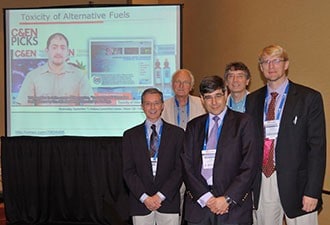UAMS Professor Debates on Key Public Health Issue
| 
Gunnar Boysen (far right), Ph.D., recently organized a symposium in Indianapolis on the toxicity of alternative fuels.
Oct. 16, 2013 | Alternative fuels produce fewer greenhouse gases and thus are better for the environment. But what about their toxicity and risk to human health? A year ago this crucial question was raised by UAMS faculty member Gunnar Boysen, Ph.D., at a planning session for the American Chemistry Society’s (ACS) 2013 annual meeting.
The question so piqued his colleagues’ interest that Boysen, an assistant professor in the Department of Environmental and Occupational Health at the UAMS Fay W. Boozman College of Public Health and secretary of the ACS Division of Chemical Toxicology, was put in charge of organizing a symposium on the toxicity of alternative fuels for the ACS Annual Meeting in September. It was a fitting topic for an event with the theme “Chemistry in Motion” and held in Indianapolis, home to the famed Indy 500 auto race.
The topic also caught the attention of previewers of the ACS meeting, who selected it as one of the not-to-miss sessions of the four-day event in early September (video).
Boysen saw the session as an opportunity to highlight the great progress made in vehicle emissions reduction over the past century, and at the same time shed light on the potential public health risks of alternative fuels in comparison to fossil fuels.
“The initial plan was to cover the whole spectrum of toxicity associated with petroleum fuels to electric cars,” Boysen said. “Some research has revealed that the public adores biofuels because they are not considered fossil fuels and thus are not linked to oils spills like the one in Maumelle in spring 2013, et cetera. A question not really answered, or known within the general public, is whether bio-fuels are more or less toxic.”
During the symposium, several simple facts were discussed. First, the diesel engines and filter systems brought to market since 2010 produce exhaust that is as clean as – in some cases, even cleaner than – the intake air. If so, that’s a huge improvement over diesel engines built prior to 2007. Second, not all biofuels have the same levels of toxicity, as toxicity varies greatly based on source materials, such as corn or soy. Lastly, overall exhausts from bio-diesels have similar toxicity compared to petroleum-based diesel.
Despite new diesel technology, the International Agency for Research on Cancer (IARC) in fall 2012 classified diesel exhaust as a class 1 carcinogen. Several members of the IARC working group were present at the symposium and explained that risk assessment on the new technologies is not yet possible, because the needed data are not yet there.
For Boysen, research findings presented at the symposium helped tease out the facts about bio-diesel-associated health risks.
“The long life span of the older diesel models is one of the arguments why diesel exhaust has been classified as a human carcinogen,” Boysen said. “Current real-life exposures in high traffic areas are sufficiently high to cause alarm. In the end, I got the feeling that the overall toxicity of biofuels is quite similar to the toxicity induced by petroleum-based diesel if used in the same diesel engine. This stresses the importance for utilization of modern diesel engines and exhaust filter devices.”